
The Marx Brothers were an American family comedy act that was successful in vaudeville, on Broadway, and in 14 motion pictures from 1905 to 1949. Five of the Marx Brothers' fourteen feature films were selected by the American Film Institute (AFI) as among the top 100 comedy films, with two of them, Duck Soup (1933) and A Night at the Opera (1935), in the top fifteen. They are widely considered by critics, scholars and fans to be among the greatest and most influential comedians of the 20th century. The brothers were included in AFI's 100 Years... 100 Stars list of the 25 greatest male stars of Classical Hollywood cinema, the only performers to be included collectively.
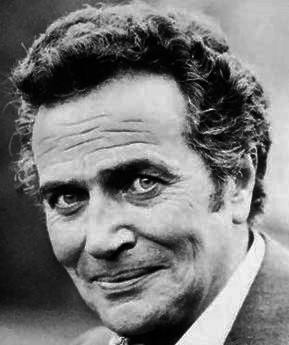
Michael Bentine, was a British comedian, comic actor and founding member of the Goons. His father was a Peruvian Briton.

Peter Sellers was an English actor and comedian. He first came to prominence performing in the BBC Radio comedy series The Goon Show. Sellers featured on a number of hit comic songs, and became known to a worldwide audience through his many film roles, among them Chief Inspector Clouseau in The Pink Panther series.
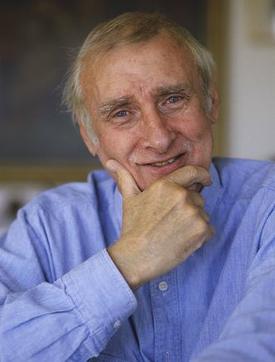
Terence Alan "Spike" Milligan was an Irish comedian, writer, musician, poet, playwright and actor. The son of an English mother and Irish father, he was born in British Colonial India, where he spent his childhood before relocating in 1931 to England, where he lived and worked for the majority of his life. Disliking his first name, he began to call himself "Spike" after hearing the band Spike Jones and his City Slickers on Radio Luxembourg.

The Goon Show is a British radio comedy programme, originally produced and broadcast by the BBC Home Service from 1951 to 1960, with occasional repeats on the BBC Light Programme. The first series, broadcast from 28 May to 20 September 1951, was titled Crazy People; subsequent series had the title The Goon Show.

Lindley Armstrong "Spike" Jones was an American musician, bandleader and conductor specializing in spoof arrangements of popular songs and classical music. Ballads receiving the Jones treatment were punctuated with gunshots, whistles, cowbells, hiccups, burps, and outlandish and comedic vocals. Jones and his band recorded under the title Spike Jones and His City Slickers from the early 1940s to the mid-1950s, and they toured the United States and Canada as "The Musical Depreciation Revue".

Richard Lester Liebman is a retired American film director based in the United Kingdom, famous for his comedic and campy style of shooting movies and for his work in both US and UK cinema.
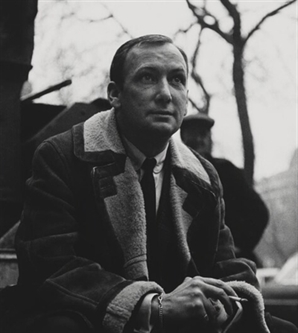
Johnny Speight was an English television scriptwriter of many classic British sitcoms.
Ian La Frenais is an English writer best known for his creative partnership with Dick Clement. They are most famous for television series including The Likely Lads, Whatever Happened to the Likely Lads?, Porridge and its sequel Going Straight, Lovejoy and Auf Wiedersehen, Pet.
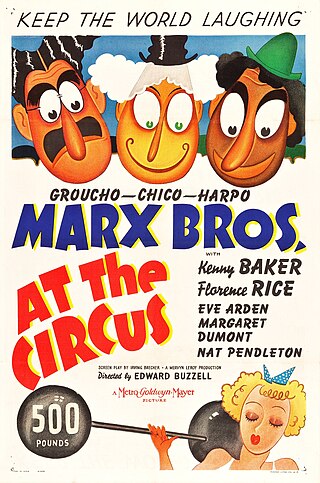
At the Circus is a 1939 comedy film starring the Marx Brothers released by Metro-Goldwyn-Mayer in which they help save a circus from bankruptcy. The film contains Groucho Marx's classic rendition of "Lydia the Tattooed Lady". The supporting cast includes Florence Rice, Kenny Baker, Margaret Dumont, and Eve Arden. The songs, including "Lydia the Tattooed Lady", "Two Blind Loves", and "Step Up and Take a Bow", were written by the team of Harold Arlen and Yip Harburg, who'd recently furnished the songs for another MGM film that same year, The Wizard of Oz.

The Cocoanuts is a 1929 pre-Code musical comedy film starring the Marx Brothers. Produced for Paramount Pictures by Walter Wanger, who is not credited, the film also stars Mary Eaton, Oscar Shaw, Margaret Dumont and Kay Francis. The first sound film to credit more than one director, it was adapted to the screen by Morrie Ryskind from the George S. Kaufman Broadway musical play. Five of the film's tunes were composed by Irving Berlin, including "When My Dreams Come True", sung by Oscar Shaw and Mary Eaton.

The Running Jumping & Standing Still Film is a 1959 British sketch comedy short film directed by Richard Lester and Peter Sellers, in collaboration with Bruce Lacey.
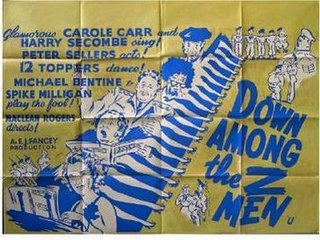
Down Among the Z Men is a 1952 black-and-white British comedy film directed by Maclean Rogers and starring the Goons: Spike Milligan, Peter Sellers, Michael Bentine and Harry Secombe.

Penny Points to Paradise is a 1951 comedy feature film directed by Tony Young and starring Spike Milligan, Harry Secombe and Peter Sellers of The Goon Show in their feature film debut.
Tony Young (1917–1966), sometimes credited as Anthony Young, was a British film director and television producer. His films include Penny Points to Paradise (1951), The Eternal Question (1956) and The Runaway (1963).

Never Let Go, also known as Moment of Truth, is a 1960 British thriller film directed by John Guillermin and starring Richard Todd, Peter Sellers and Elizabeth Sellars. It concerns a man's attempt to recover his stolen car. Sellers plays a London villain, in one of his rare serious roles.

Adelphi Films Limited was a British film production company. With its sister company Advance, it produced over 30 films in the 1940s and 1950s and distributed many more. Adelphi linked Gainsborough Pictures and the raw “kitchen sink” dramas of the early 1960s.

The Great McGonagall is a 1974 British comedy film directed by Joseph McGrath and starring Spike Milligan, Peter Sellers and Julia Foster. It was written by McGrath and Milligan.
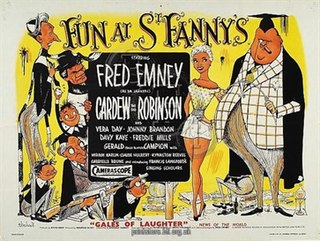
Fun at St. Fanny's is a 1955 British comedy film directed by Maurice Elvey and starring Fred Emney, Cardew Robinson and Vera Day. The film revolves around the teachers and students at St Fanny's private school. It was based on Robinson's "Cardew the Cad" character which he created in 1942 and was featured in the BBC's Variety Bandbox programme.

Calling All Cars is a 1954 short film directed by Maclean Rogers, starring Cardew Robinson and John Fitzgerald. The film also features Spike Milligan voicing the thoughts of "Freddie", an old taxicab featured in the film.


















